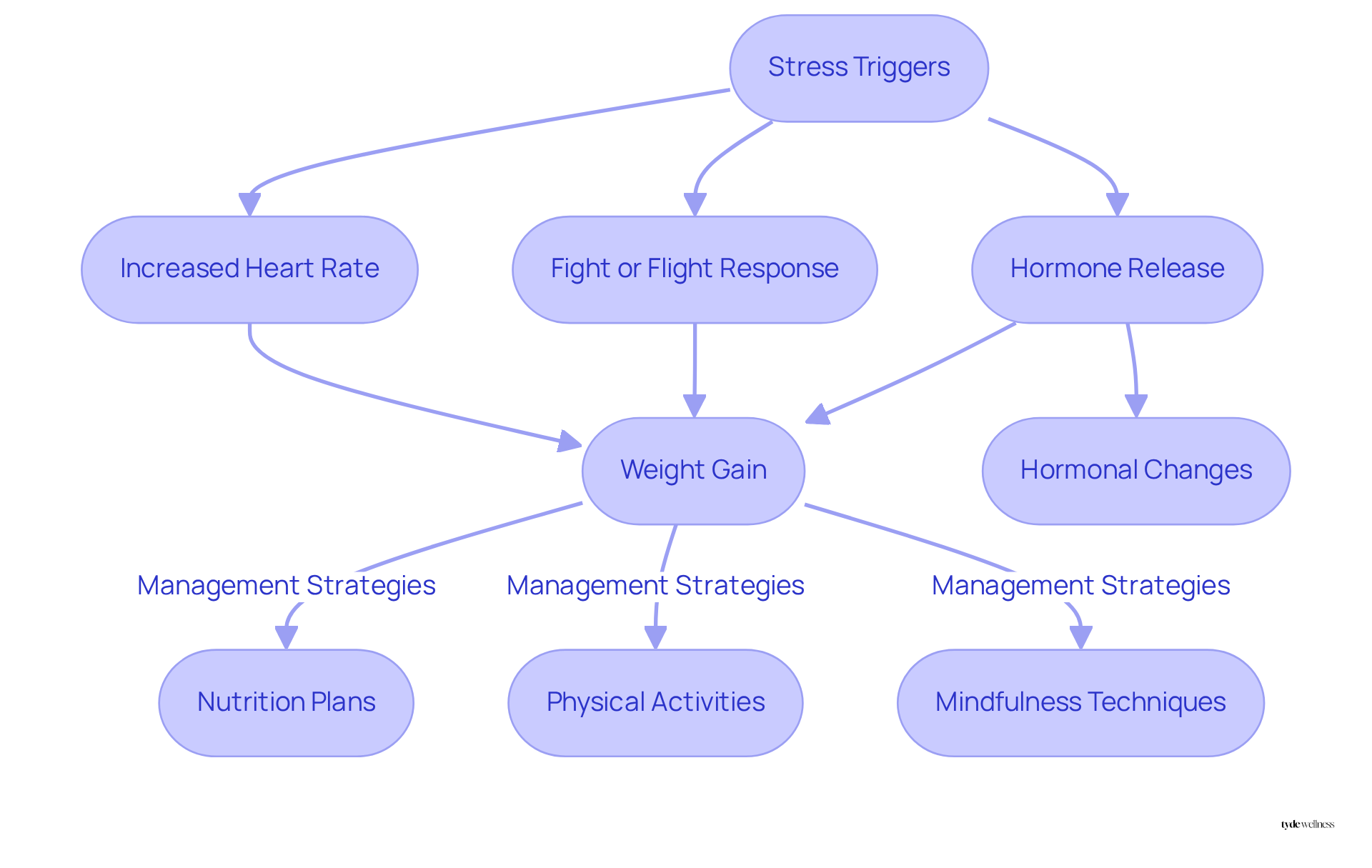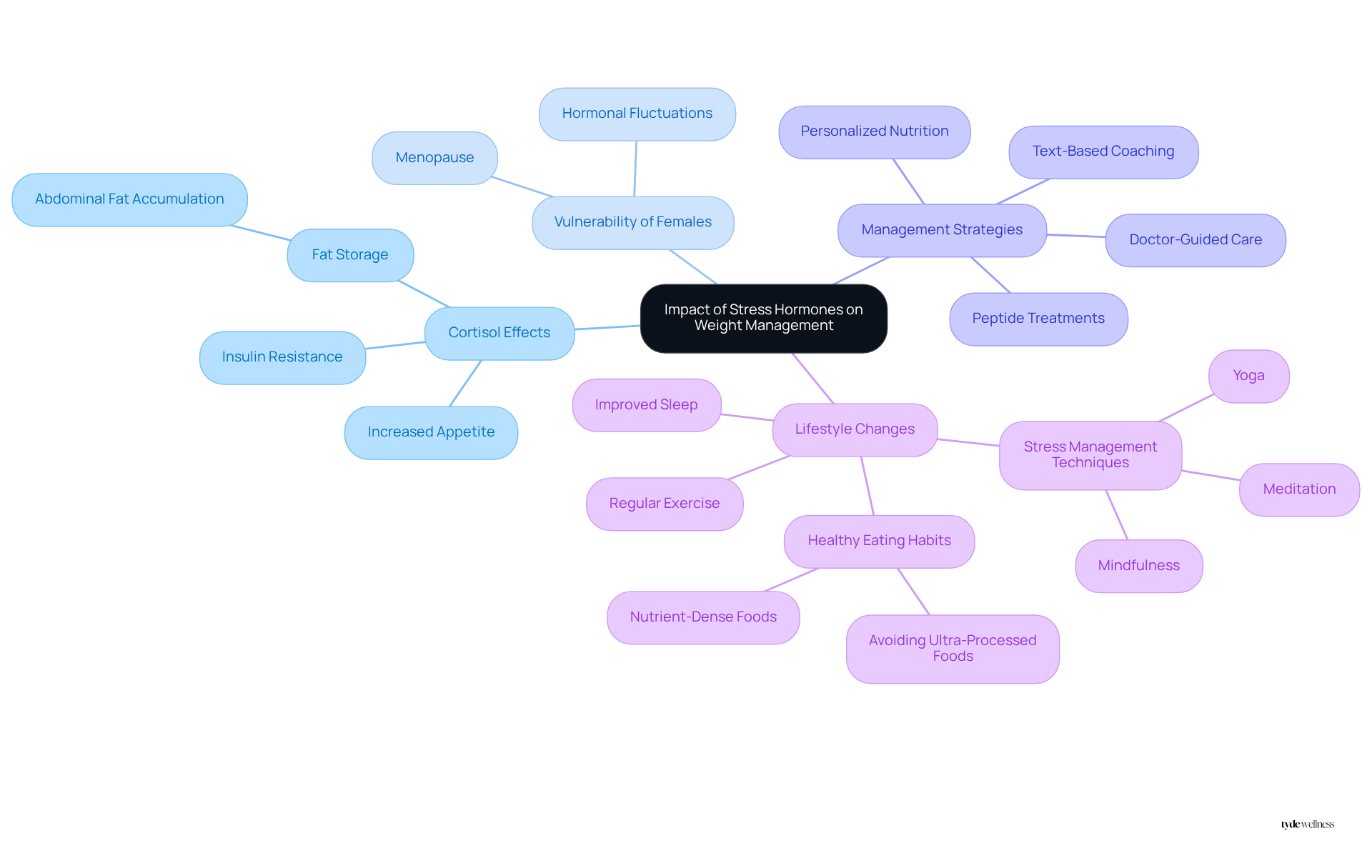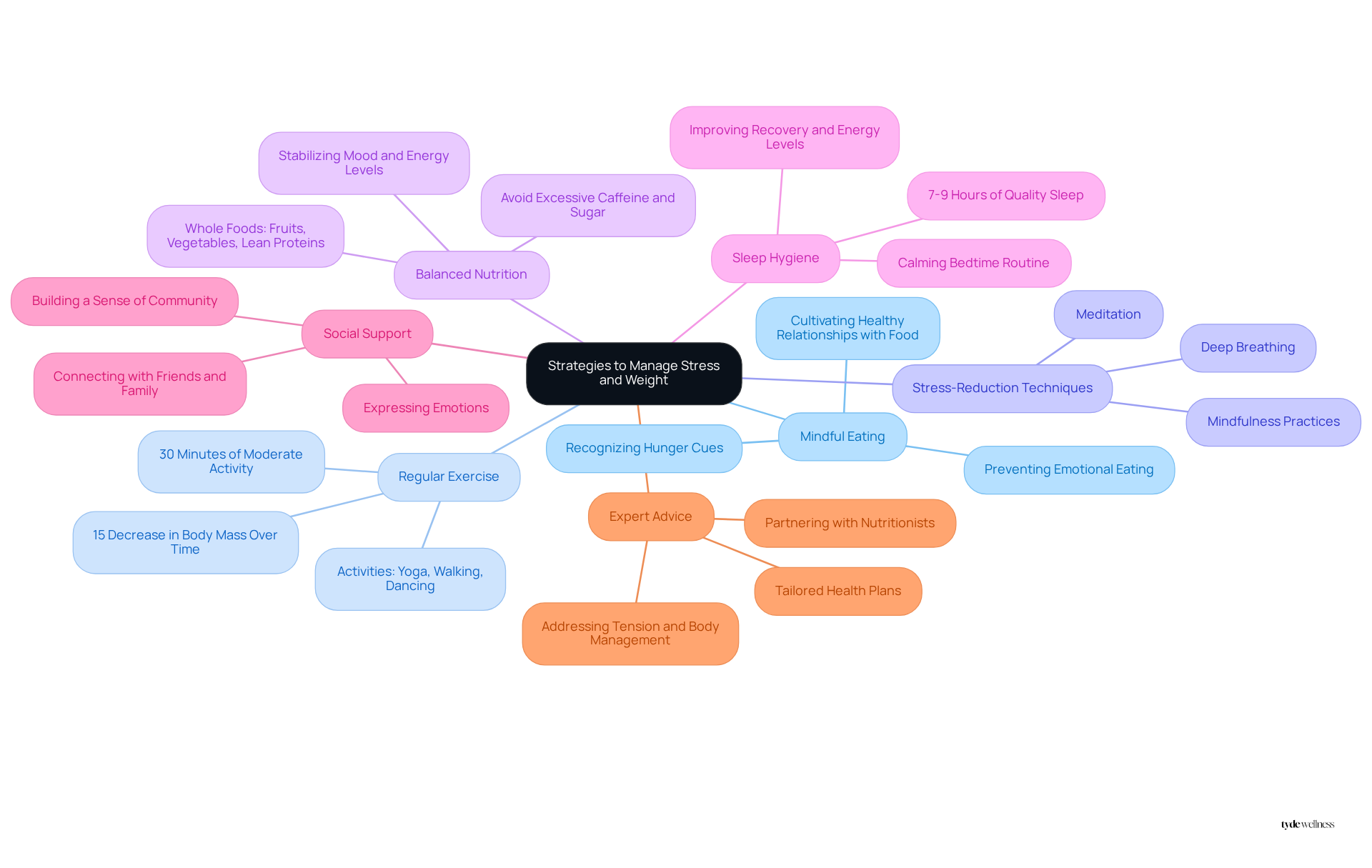Overview
Understanding stress is crucial for women, as it significantly influences weight gain through hormonal changes, particularly the effects of cortisol. Chronic stress leads to increased cortisol levels, which drive cravings for high-calorie foods and promote fat storage. This is especially relevant during critical life stages like menopause. Therefore, effective stress management strategies are essential for maintaining a healthy body weight.
Introduction
Understanding the intricate relationship between stress and weight gain is crucial, particularly for women who often face unique physiological challenges. Stress triggers a cascade of hormonal responses that not only affect emotional well-being but also influence metabolism and appetite, potentially leading to weight gain.
How can women navigate this complex terrain to regain control over their health and body composition? This article delves into the physiological impacts of stress, highlights effective management strategies, and offers insights into reclaiming a balanced lifestyle amidst the pressures of daily life.
Explore the Physiological Impact of Stress on the Body
Stress triggers a complex physiological response in the body, primarily through the release of hormones such as cortisol and adrenaline. When faced with pressure, the body enters a ‘fight or flight’ mode, preparing to react to perceived threats. This response can lead to increased heart rate, heightened blood pressure, and significant changes in metabolism. Persistent pressure results in extended exposure to these hormones, which can lead to multiple health problems, including stress and weight gain. For females, hormonal changes during perimenopause and menopause can exacerbate these effects, making it essential to understand how tension specifically influences their bodies.
Studies show that , which contribute to stress and weight gain, are associated with a greater desire for high-calorie foods, leading to an increase in body mass over time. Research indicates that women experiencing high pressure levels report an average pressure rating of 5.3 out of 10, compared to 4.8 for men, emphasizing the distinct challenges women face, particularly regarding family obligations and financial issues. Moreover, persistent tension can interfere with estrogen, progesterone, and thyroid function, complicating efforts to manage stress and weight gain in the body.
Identifying these physiological changes is the first step in effectively managing stress and reducing its impact on body composition. At Tyde Wellness, we provide comprehensive and customized solutions for weight loss, including:
- Doctor-guided care
- Nutrition plans designed for busy schedules
- GLP-1 therapy to assist with sustainable weight loss
Our continuous support, including text-oriented coaching and community involvement through Tyde Circle members, empowers women to effectively manage issues related to stress and weight gain. Strategies such as prioritizing sleep, engaging in gentle physical activities like yoga, and practicing mindfulness techniques can help lower cortisol levels and promote overall well-being. Furthermore, individuals should seek medical assistance if increases in body mass persist despite lifestyle modifications, as professional support is crucial for effectively managing stress and weight gain. By addressing the underlying stressors and adopting healthier coping strategies, such as cognitive reframing, enjoying nature, and practicing gratitude, individuals can regain control over their health and management of body composition.

Examine How Stress Hormones Affect Weight Management
Cortisol, often referred to as the ‘stress hormone,’ plays a significant role in the relationship between stress and weight gain, particularly in females. When anxiety levels increase, cortisol is released, leading to various metabolic changes. Elevated cortisol not only heightens appetite—especially for sugary and fatty foods—but also promotes fat storage, particularly in the abdominal area, which carries several health risks.
Research indicates that females are especially vulnerable to these effects due to hormonal fluctuations during critical life stages, such as menopause. For instance, a study highlighted that as females approach menopause, higher cortisol levels correlate with intensified responses, resulting in increased insulin levels and subsequent fat accumulation. Chronic stress can also lead to insulin resistance, complicating the body’s ability to regulate blood sugar and maintain a healthy weight. This interaction between stress and weight gain highlights the importance of developing effective management strategies tailored to the unique challenges individuals face under stress.
At Tyde Wellness, we offer a comprehensive approach to weight management that includes:
- Doctor-guided care
- Personalized nutrition plans
- Text-based coaching
- Optional peptide treatments
Our initiative is designed to empower individuals to reclaim their health and effectively control their body. By prioritizing lifestyle changes such as improved sleep—aiming for 7 to 9 hours nightly—regular exercise, and stress management techniques like yoga, meditation, and mindfulness, individuals can better regulate cortisol levels and mitigate its impact on body composition.
Additionally, steering clear of ultra-processed foods, refined carbohydrates, added sugars, and alcohol can help maintain balanced cortisol levels. Understanding the cycle of emotional eating is also crucial, as it can exacerbate weight gain. With Tyde Wellness’s and accessible health coaching, women can navigate these challenges with the support they need to achieve sustainable weight loss and enhance their health.

Implement Effective Strategies to Manage Stress and Weight
Effectively managing tension is crucial for preventing stress and weight gain while maintaining a healthy body mass. Here are several strategies that can help:
- Mindful eating involves engaging fully during meals to recognize hunger cues and prevent emotional eating, especially in relation to stress and weight gain. Research indicates that mindful eating can greatly enhance management of body mass in women by cultivating a healthier relationship with food.
- Regular Exercise: Physical activity acts as a strong tension reducer. Aim for at least 30 minutes of moderate exercise most days of the week. Activities such as yoga, walking, or dancing not only alleviate tension but also aid in fat loss, with studies suggesting that regular exercise can result in a 15% decrease in body mass over time.
- Stress-Reduction Techniques: Incorporate relaxation practices like deep breathing, meditation, or mindfulness into your daily routine. These techniques can , which are associated with stress and weight gain, and improve overall well-being.
- Balanced Nutrition: Focus on a diet rich in whole foods, including fruits, vegetables, lean proteins, and healthy fats. Steer clear of excessive caffeine and sugar, as these can elevate tension and cravings, resulting in unhealthy eating habits.
- Sleep Hygiene: Prioritize quality sleep, as inadequate rest can increase anxiety levels and lead to additional pounds. Establish a calming bedtime routine and aim for 7-9 hours of sleep per night to support recovery and energy levels.
- Social Support: Connect with friends and family for emotional support. Expressing emotions can reduce pressure and promote a sense of community, which is essential for mental well-being.
- Expert Advice: Consider partnering with a nutritionist or health coach focusing on female health to create a tailored plan that addresses both tension and body management.
By implementing these strategies, women can effectively manage stress and weight gain, leading to healthier lifestyles and improved overall health.

Conclusion
Understanding the intricate relationship between stress and weight gain is essential for women seeking to maintain their health and well-being. Stress triggers physiological changes, particularly through the release of cortisol, which can lead to increased appetite and fat storage. Recognizing these mechanisms is crucial for developing effective strategies to combat stress-related weight gain.
The distinct challenges women face regarding stress, especially during hormonal fluctuations such as menopause, are significant. Various strategies to manage stress and weight are outlined, including:
- Mindful eating
- Regular exercise
- Prioritizing sleep
Additionally, the importance of seeking professional guidance and support to navigate these challenges effectively cannot be overstated.
Ultimately, addressing stress and its impact on weight transcends physical health; it fosters a holistic approach to well-being. By implementing the strategies discussed and actively seeking support, women can regain control over their health and cultivate a balanced lifestyle. Taking proactive steps toward managing stress can lead to lasting improvements in both mental and physical health, reinforcing the significance of this vital connection.
Frequently Asked Questions
What physiological response does stress trigger in the body?
Stress triggers a complex physiological response primarily through the release of hormones such as cortisol and adrenaline, leading the body to enter a ‘fight or flight’ mode.
What are the immediate effects of stress on the body?
The immediate effects of stress include increased heart rate, heightened blood pressure, and significant changes in metabolism.
How does persistent stress affect health?
Persistent stress leads to extended exposure to stress hormones, which can result in multiple health problems, including stress-related weight gain.
How do hormonal changes in women affect stress management?
Hormonal changes during perimenopause and menopause can exacerbate the effects of stress, making it essential for women to understand how tension influences their bodies.
What is the relationship between cortisol levels and weight gain?
Heightened cortisol levels, which contribute to stress, are associated with a greater desire for high-calorie foods, leading to an increase in body mass over time.
How do stress levels compare between men and women?
Studies indicate that women experiencing high pressure levels report an average stress rating of 5.3 out of 10, compared to 4.8 for men, highlighting distinct challenges faced by women.
What physiological functions can persistent stress interfere with?
Persistent stress can interfere with estrogen, progesterone, and thyroid function, complicating efforts to manage stress and weight gain.
What solutions does Tyde Wellness offer for managing stress and weight?
Tyde Wellness provides comprehensive and customized solutions for weight loss, including doctor-guided care, nutrition plans, and GLP-1 therapy for sustainable weight loss.
What strategies can help lower cortisol levels?
Strategies to lower cortisol levels include prioritizing sleep, engaging in gentle physical activities like yoga, and practicing mindfulness techniques.
When should individuals seek medical assistance for stress-related weight gain?
Individuals should seek medical assistance if increases in body mass persist despite lifestyle modifications, as professional support is crucial for managing stress and weight gain effectively.
What coping strategies can help individuals regain control over their health?
Healthier coping strategies include cognitive reframing, enjoying nature, and practicing gratitude to address underlying stressors and improve body composition management.
List of Sources
- Explore the Physiological Impact of Stress on the Body
- Why Women Are More Stressed Than Ever And How To Address It – The American Institute of Stress (https://stress.org/news/why-women-are-more-stressed-than-ever-and-how-to-address-it)
- How Stress and Cortisol Contribute to Weight Gain in Women (https://soula.care/blog/stress-and-anxiety/stress-and-cortisol-weight-gain)
- Higher Stress Levels May Cause Weight Gain in Women (https://cedars-sinai.org/discoveries/weight-gain-in-women.html)
- How Stress Affects Women (https://my.clevelandclinic.org/health/articles/5545-women-and-stress)
- The hidden effects of chronic stress on women’s health – The Times of India (https://timesofindia.indiatimes.com/life-style/health-fitness/health-news/the-hidden-effects-of-chronic-stress-on-womens-health/articleshow/120629299.cms)
- Examine How Stress Hormones Affect Weight Management
- Higher Stress Levels May Cause Weight Gain in Women (https://cedars-sinai.org/discoveries/weight-gain-in-women.html)
- How Stress and Cortisol Contribute to Weight Gain in Women (https://soula.care/blog/stress-and-anxiety/stress-and-cortisol-weight-gain)
- Understanding cortisol’s role in weight gain (https://nuvancehealth.org/health-tips-and-news/cortisol-and-weight-gain)
- The truth about cortisol, aging, and weight loss in women (https://boston25news.com/news/truth-about-cortisol-aging-weight-loss-women/U7WMD32UMFNZ7HDRDPP6MDDI3Y)
- Implement Effective Strategies to Manage Stress and Weight
- Women and Stress Management Tips to Help You (https://associatesinwomenshealthcare.net/blog/women-and-stress-tips-for-stress-management)
- Effective Stress Management Tips for Women: Foods, Sleep, and Self-Care – The Remedy Mental Health (https://theremedymn.com/effective-stress-management-tips-for-women-foods-sleep-and-self-care)
- Effective Stress Management for Women | WTG (https://williamsburgtherapygroup.com/blog/effective-stress-management-for-women-wtg)
- Effective Stress Management Techniques to Improve Well-Being (https://monadnockcommunityhospital.com/stress-management-techniques-that-work)
- How can women manage stress and its impact on physical health? | MagView (https://magview.com/womens-health/how-can-women-manage-stress-and-its-impact-on-physical-health)



